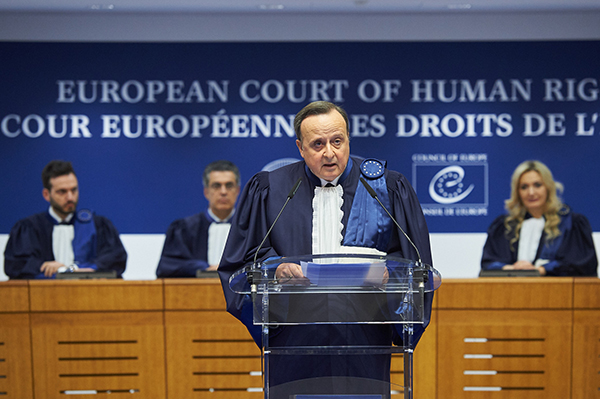mer, Oct 12th 2022
The Swiss government has been discriminating against men when it comes to doling out pension benefits, the European Court of Human Rights (ECHR) ruled this week. The ruling asks Switzerland to re-write its Old-Age and Survivor’s Insurance (AHV) pension law and pay back millions in retroactive fees.

ECHR judges hand down their decision on the Beeler case.
More on the pension law
As the law stands now, widowed women are paid a pension for the rest of their lives, while widowered men only receive those same payments if they have children under the age of 18. The law is based on an outdated concept of the “male breadwinner.”
The law first came under scrutiny with the case of a Swiss man, Max Beeler. When Beeler’s wife died in an accident in the early 1990s, Beeler left his job to care for their two young children. He was 41 at the time. Beeler received a pension until 2010, when his youngest child turned 18 years old.
If Mr. Beeler had died instead of his wife, she would have kept receiving the pension payments for the rest of her life; but, his were cut off promptly on the child’s 18th birthday. Moreover, his wife would have received the payments whether they had children or not. She would have even received payments if they had been divorced, under Swiss AHV law.
In Switzerland “men are considered privileged, women are disadvantaged,” writes Katharina Fontana in a commentary for local newspaper NZZ. Fontana adds “This is somewhat paradoxical, because from a legal point of view the situation is the other way around. Today it is exclusively men who are worse off than women in several legal areas: retirement age – which will soon be history thanks to the [recent vote on] the AHV reform, compulsory military service, and the AHV survivor’s pension.”

Switzerland has the 12th most generous old-age pension in the world.
The path to the ECHR
Mr. Beeler, who had not been in the work force for many years, filed an appeal against the decision in his cantonal court of Appenzell. (For reference, Appenzell is considered one of the most conservative cantons in Switzerland. Women only received the right to vote here in the 1990s).
That first appeal was defeated in the Appenzeller court. The ruling stated that Swiss law recognizes men as the main breadwinner and that widowers can return to work once their childcare responsibilities have ended. The same is not expected of widows.
Fontana writes that the Swiss “Federal Council and Parliament have been trying to limit the claims of widows and to find a solution that is appropriate to the present day. But whenever things get serious, people step back, as taking action against widows is politically sensitive, and you won’t get any laurels for it.”
Beeler was undeterred and continued to look for a court who would hear his case until he reached the ECHR in Strasbourg, France. After arguing his case earlier this year, the court handed down its decision Tuesday. It found that the role of women in the workplace has greatly evolved since the Swiss law was created, and that the discrepancy in pensions violates Article 14 of the European Convention on Human Rights.

The ECHR in Strasbourg, France.
Quelle est la suite des événements ?
Beeler will now receive his pension and other widowers are allowed to come forward and claim their unpaid benefits – a bill that could amount to several million for Switzerland, according to the ECHR.
The decision reopens a long-running debate as to how much power European courts have over domestic law. The ECHR has 46 members, including several countries, like Switzerland, which are not EU members.
The decision also challenges Switzerland’s perspective on men and women in various roles.
Just two weeks ago Swiss citizens voted to increase women’s retirement age from 64 to 65 (in line with men’s) as part of a nationwide voter referendum. The vote passed with the narrowest of margins (50.6 percent). The argument for allowing women to retire early one year is based on the idea that women take on more work in the realm of child care and housework, often, in addition to paid jobs. In fact, 82 percent of mothers in Switzerland work, which is above the European average, according to federal data released this week.
Switzerland’s search for gender equality may also reignite the conversation of Switzerland’s persistent gendered pay gap. Swiss women earn, on average, 11 percent less than men for doing the same job, according to federal statistics. And in the last year, there has been a call for women to begin serving compulsory military service, like their male counterparts.
So, if the Swiss government moves forward with shoring up the pension disparities, it may need to address a bevy of other gender disparities.
Cet article peut être librement partagé et réimprimé, à condition qu'il renvoie clairement à l'article original.
